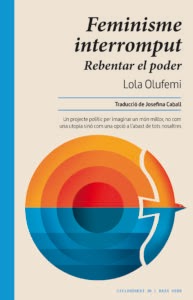
Idioma original: English
Original title: Feminism, Interrupted: Disrupting Power
Translation: Josefina Caball in Catalan for Raig Verd and Laura Estefanía in Spanish for Rayo Verde
Year of publication: 2023
Valuation: advisable
It is always interesting to expand our knowledge about the inequalities that exist in our society, whether in the concepts of racism, feminism, capitalism, etc. And it often happens that all of these concepts are linked, because oppression is always directed at the most vulnerable parts of society and tends to go from top to bottom on the social scale.
The author directly criticizes sexism, a sexism that goes beyond individual behavior or thoughts, since it is structurally embedded in government agencies and structures. She therefore states that “when feminists call the state ‘sexist,’ they mean that state provision, resource allocation, and the way in which supervision is carried out reinforce gender oppression by restricting women’s freedom.” This sexism is also present in legislation that seeks to combat it, since, in terms of protective laws against domestic violence, the author states that “the most urgent issue for survivors is not that their aggressors go to jail, but that there is a safety net that they can rely on and that allows them to escape from abusive situations. They need shelters, avenues for economic stability, and adequate social assistance.” Thus, he not only criticises the mentality but also how it governs everyday life, how priorities are elsewhere, completely correct in his questioning of the usefulness of a state in which its interests are not directed towards the disadvantaged, asking: “What good is a country that refuses to put the needs of its citizens before capitalist progress?”
It must be said that part of the book is focused on Great Britain (the country where the author was born and resides) so in some cases the examples given do not entirely coincide with what would be applicable in other countries and in some cases makes the reading lose some interest, although, in any case, it is an interesting book because it helps to broaden the view on feminism, as well as to remember concepts that in some cases we already knew or intuited.
The author says that “if this book inspires you to choose another one or to watch a documentary, to search the archives, to pick up a book of poetry – if it ignites or rekindles your interest in feminism – I will have achieved my goal.” And this is undoubtedly a goal that, through this review, I share with her.
Source: https://unlibroaldia.blogspot.com/2024/09/lola-olufemi-feminismo-interrumpido.html


